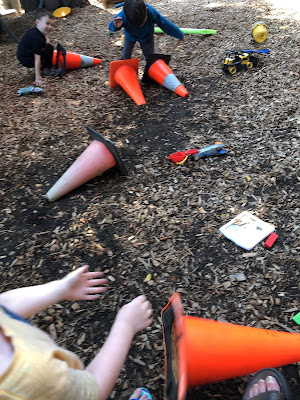Much of what passes for education, not just in the US, but around the world, starts with the premise that children aren't all that bright, that they are essentially lazy, and that they can't be trusted to know what's best for themselves. Of course, few of us would admit to thinking such thoughts about preschoolers, but there are plenty of adults who will authoritatively assert these criticisms about older children, like teenagers.
Having worked with young children for most of my adult life, I can assure you that every one of them is a genius (
a conclusion that is supported by NASA), they are far less inclined toward laziness (
if it even exits) than most adults I know, and concerning matters beyond safety, schedules, and courtesy, who am I to tell a child that I know better? The teenagers I've known don't tick any of those stereotyped boxes either, but even if I stipulate that the haters are correct, that many, if not most, teens are ignorant, lazy, and self-destructive, then my question is: How did they get that way? I mean, honestly, how did they un-learn their genius, their motivation, and their ability to make good decisions for themselves?
Is it just in their nature? Are children doomed by biology to become surly, indifferent, and slothful? I doubt that. It makes no sense from an evolutionary perspective. No, to the degree that it's true, it's something we do to them, and from where I sit all signs point to it being a self-fulfilling prophesy.
"I'm beginning to suspect all elaborate and special systems of education. They seem to me to be built upon the supposition that every child is a kind of idiot who must be taught to think." ~Anne Sullivan
Our entire school system is based upon the premise that children are reluctant learners, that they must be compelled, coerced, tricked, and driven. Not only must we adults rein them up to the wagon for their own good, but we are then required to entice them toward a pre-determined destination with carrots, while always threatening from behind with a stick. Is it any wonder that after a few years of this, they lose their will? We give them "education" as a kind of meaningless drudge, as an authoritarian exercise that seems almost designed to break their free will, even as we insist we are attempting to instill the opposite. How can it end any other way when you've been robbed of your right to control what, how, and when you are to learn? We squander their genius by making them jump through our hoops.
"Learning is the human activity that least needs manipulation by others. Most learning is not the result of instruction. It is rather the result of unhampered participation in a meaningful activity." ~Ivan Illich
Children either come to hate school because it has been rendered meaningless or, perhaps worse, they become creatures of the system:
The anxiety children feel at constantly being tested, their fear of failure, punishment, and disgrace, severely reduces their ability both to perceive and to remember, and drives them away from the material being studied into strategies for fooling teachers into thinking they know what they really don't know." ~ John Holt
Play-based education is self-directed learning. We start from the premise that children are geniuses, that they are naturally self-motivated learners, and that when left to pursue activities that they themselves find meaningful, they will come to discover what truly is best for themselves. This approach to education accords with what we know about the human instinct to learn: to become critical thinkers, to collaborate, and to create. Our traditional school system is not based upon evidence, but rather habit and the false premise that children are idiots.
"You are about to be told one more time that you are America's most valuable natural resource. Have you seen what they do to valuable natural resources? Have you seen a strip mine? Have you seen a clear cut in the forest? Have you seen a polluted river? Don't ever let them call you a valuable natural resource!" ~Utah Phillips
There are those who nevertheless defend our current system, based on arguments that without "rigor" and compulsion children will never learn the value of "hard work." If they are to spend their days at their self-selected activities, how will they ever learn to put their nose to the grindstone? To do what they are told? To jump through society's hoops? These are the arguments of those who will forever attach education to the economy, as if we exist to serve it, rather than the other way around. It's a view of children as valuable natural resources, which means that we have a right to exploit them in the name of a greasy buck. "Hard work" is code for doing things we don't want to do and no free human, no matter how much they practice, gets good at that, except perhaps for people who have been broken, a fate I'd not wish on anyone. If you want to see real hard work, swing by a preschool playground where children are busy pursuing their own freely chosen meaningful activities: no one on earth works harder.

I have never met a child who is not curious and curiosity is the human urge to learn made manifest. Schooling seems to be designed to erase that curiosity and replace it with mere performance.
"This is really what the whole debate over compulsory schooling is about. Do we trust people's capacity to be curious or not?" ~Astra Taylor
No comments:
Post a Comment